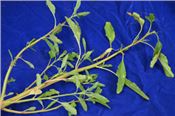Plant Clinic Screening Waterhemp For Herbicide Resistance This Season

Waterhemp
University of Illinois Plant Clinic photo
DR. SUZANNE BISSONNETTE
URBANA, ILL.
New testing for 2015: U of I Plant Clinic is offering molecular screening of waterhemp populations for resistance to glyphosate and PPO inhibitor herbicides this growing season. Protocols developed by University of Illinois Weed Scientist Dr. Pat Tranel, supported by Illinois Soybean Association and Pioneer, are now being offered through the Plant Clinic. The fee for the molecular testing is $50 per tested field. This includes both tests.
Herbicide-resistant waterhemp populations continue to expand into more areas of Illinois each season. Waterhemp has evolved resistance to herbicides encompassing more mechanisms of action than any other Illinois weed species. Not every individual waterhemp plant is resistant to one or more herbicides, but the majority of field-level waterhemp populations contain one or more types of herbicide resistance. Perhaps even more unnerving is the occurrence of multiple herbicide resistances within individual plants and/or fields. Don’t know if you have resistance or an application failure? Let us test it to get an answer for you.
To submit waterhemp weed samples:
After applying herbicide, select five waterhemp survivors in the field. Remove the top two inches from each plant (containing young, newly emerged, healthy leaves), and seal it in a sandwich-sized zip-top plastic bag. Use a separate bag for each plant. Do not place damp paper towels in bags. Place the bags in an envelope and send by overnight delivery to University of Illinois Plant Clinic. Ideally, samples should be sent the same day they are collected, but if necessary, they can be stored for a day or two in a refrigerator (but do not freeze). Do not send samples on a Friday or Saturday.
Submit the sample with the sample form; download form at this Plant Clinic website link:
http://web.extension.illinois.edu/plantclinic/downloads/WaterhempForm.pdf
Completely fill out the form for each field (1 field=5 plants=1 sample).
Additional Information: Please include herbicide use history, herbicides and rates applied this season, comments on observed weed control, and any other relevant information.
Need some Pigweed/Amaranth/Waterhemp ID practice?: See this recent article from Dr. Aaron Hager http://bulletin.ipm.illinois.edu/?p=3168
FAQ’s:
Question 1: I have Marestail, giant ragweed, etc. that I think is resistant to glyphosate. Will the Plant Clinic test it?
Answer 1: No, at this time our testing protocols are specific for Waterhemp.
Question 2: Do you test for all mechanisms for resistance to glyphosate and PPO inhibitors?
Answer 2: No, the protocol used for testing resistance to glyphosate looks for the amplification of the EPSPS gene. Dr. Tranel’s research indicates that this mechanism represents about 80 percent of glyphosate resistant waterhemp populations in Illinois. The PPO resistance protocol tests for a specific mutation in the PPX gene.
Question 3: Does ‘sensitive’ mean it’s not resistant to the herbicide(s)?
Answer 3: No, a test result of “sensitive” to glyphosate does not rule out the possibility that the plant actually is resistant, but by a resistance mechanism that is different than for what we are testing. ∆
DR. SUZANNE BISSONNETTE: Plant Diagnostic Clinic and IPM coordinator, University of Illinois